Bridging Belief: Catching up with Orchidée Wafo, The Bridge Magazine welcomes and shares another poem from its young contributor, composed when she was 9 years old. It was a poem about a conversation with God, free will, and life after death. Now that she has turn 18 we wanted to know if her view about religions as a whole and God have evolved.
20 May 2019
3,901 views
No Comment
Philosophy, existentialism, religion-related topics, the existence or non-existence of a deity, the ability and the extent to which humans can use their free will to impact their lives and the world, are not usually a child’s concern.
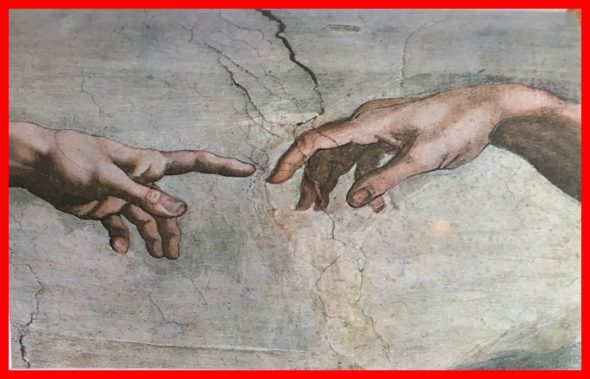 Michelangelo paining. The Creation of Adam.
Michelangelo paining. The Creation of Adam.
“If God created us in his own image, we have more than reciprocated.” François-Marie Arouet(1694 – 1778), most famous under his pen name Voltaire, was a French writer, deist and philosopher.
The Bridge MAG. Image.
Brain development is believed to continue from infancy to adulthood. However, many parents underestimate how much a child’s brain changes from year to year. Nine years later, curious to learn more about Orchidée’s view on religions as a whole, and the existence of God, on Tuesday May 7th 2019, she opened up to The Bridge Magazine:
“I strongly believe in a positive supernatural entity that is more powerful than anything else and I also believe in positive energies. However, its name is not what I think society and or different religions and denominations call it. It is yet to be discovered only once we die.”
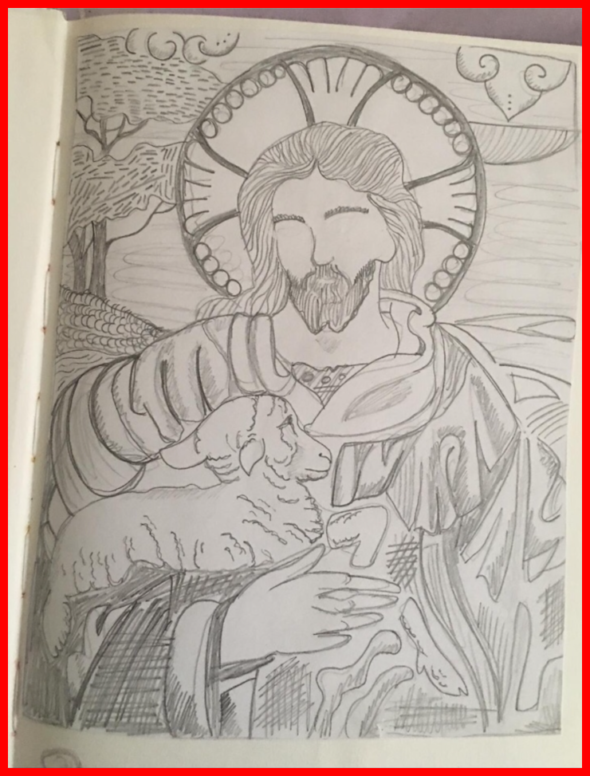
Observational drawing of Jesus holding a lamb using different mediums by Orchidée Wafo.
The peculiar element of Orchidée’s art work is that the faces always remain unfinished. When asked as to the reason why, she replied:
“It defies the principle of a supernatural entity’s identity to remain ambiguous to the human eye. It can only subsequently be fully revealed to a person after death.”
The Bridge MAG. Image.
Our young contributor still believes in the mystery of life. One of our favourite quotes of hers is “A crystal blue light holds the key to our life.”
When asked as a young adult why she believes in energies and by extension a nameless supernatural entity, she replied:
“I personally do not think one must be of a certain ethnicity, social class or religion to understand certain principles of energies. For example, a pregnant woman should not attend a funeral (unless it is her mother’s) as her unborn child is arguably a benevolent entity yet to surface, subsequently the child must not be tainted by a disappearing physical entity which has already begun its journey toward death.”
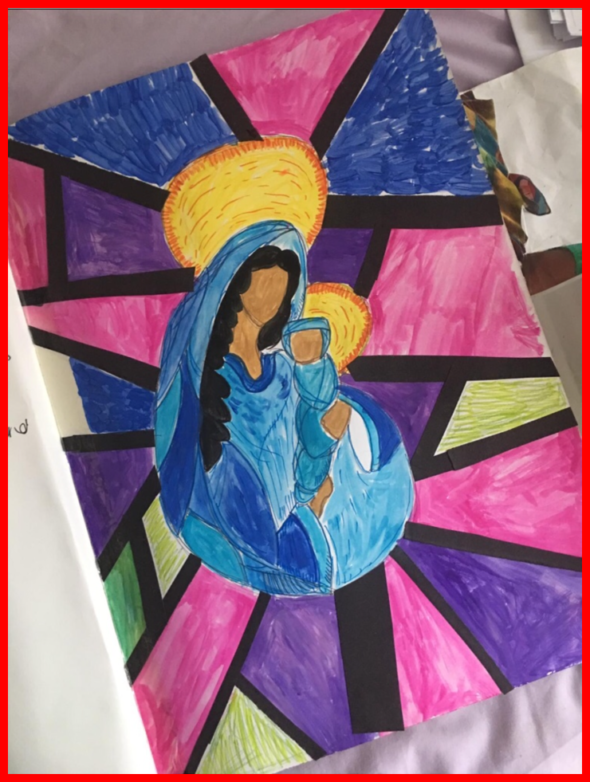
Observational drawing of The Virgin Mary holding baby Jesus using different mediums by Orchidée Wafo.
The Bridge MAG. Image.
At 9, one is supposed to be busy watching their favourite cartoon or playing Lego. When asked what motivated her to independently write about such a serious topic, she replied:
“I have always been fascinated by societies’ constructs of benevolent figures in religions such as God, Jesus, Mary, Allah, Mohammed, Buddha, Vishnu and many others. Thus I knew that following the principle of most religions, one can only experience full enlightenment in the afterlife once they are no longer in contact with the living- they must be a dead soul. Subsequently I used my imagination and the influence of biblical notions to create a conversation with one of the benevolent figures throughout religions- God- in this case. I sought to follow the structure of catechisms which is used in Catholicism.”
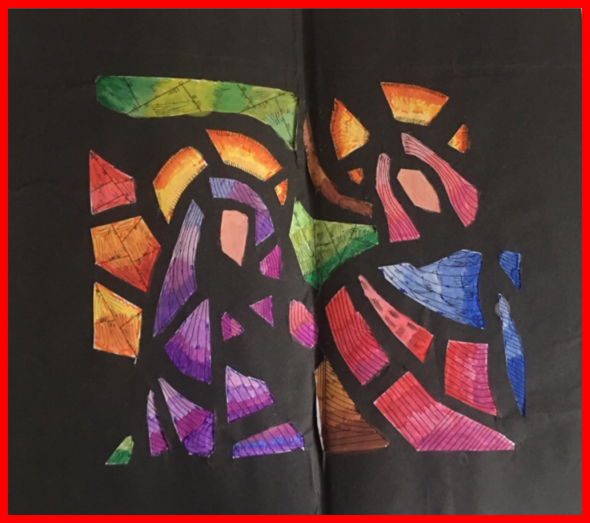 Observational drawing of The Virgin Mary and Jesus using different mediums by Orchidée Wafo.
Observational drawing of The Virgin Mary and Jesus using different mediums by Orchidée Wafo.
The Bridge MAG. Image.
Drawing and painting are some of Orchidée’s pastimes. She shared with The Bridge Magazine one of her religious related observational drawings using different mediums.
The peculiar element of this art work is that the faces always remain unfinished. When asked as to the reason why, she replied:
“It defies the principle of a supernatural entity’s identity to remain ambiguous to the human eye. It can only subsequently be fully revealed to a person after death.”
The question of God.
The existence of God has always been a topic of debate. Whether we believe in Him or not. What the mythological stories and the sacred texts tell us about His origins is yet to be proven. Without judging beliefs, historians have tried their best to reconstruct this adventure of the birth of God, delivering on the path of prodigious discoveries on mankind himself.
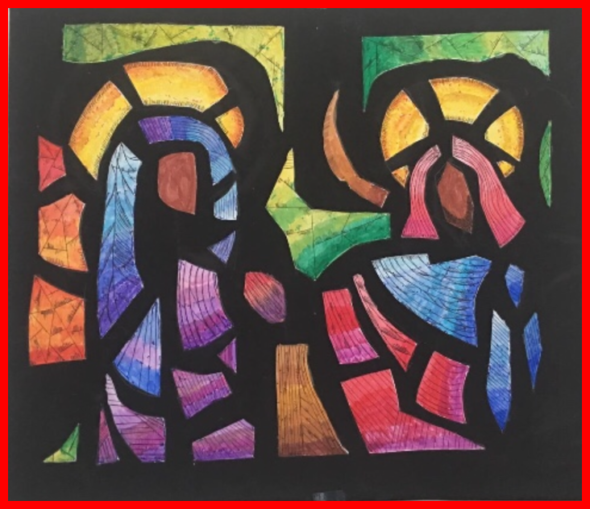
More observational drawing of The Virgin Mary and Jesus using different mediums by Orchidée Wafo.
The Bridge MAG. Image.
Some atheists, such as the German philosopher Friedrich Nietzsche, have philosophically ‘killed God’.
“God is Dead” is Nietzsche’s most widely quoted statement of his works in the presumption that Man must find a new mode of living.
For those with theisms and a more conservative approach, such as Fyodor Dostoyevsky, the belief in a supreme supernatural figure who maintains law and order in the cosmos is imperative as Mankind cannot regulate Itself socially and morally.
Theologians and conservatives when questioned about the connection between faith in God and morality will mention Dostoyevsky following his popular phrase: “If God does not exist, everything is permitted.”
Those attached to Blaise Pascal’s views will opt for the “safe option” and choose to believe in God.
Pascal’s wager is summarised as follows:
Humans bet with their lives that God either exists or does not. Pascal argues that a rational person should live as though God exists and seek to believe in God.
A pragmatic reason for believing in God: even under the assumption that God’s existence is unlikely, the potential benefits of believing are so vast as to make betting on theism rational.
The question is where do you stand? Are you a Nietzsche, a Dostoyevsky or a Pascal follower? What do you believe in?
As a reminder, Orchidée Wafo was awarded Young Reporter of the Year 2018 by The Sutton Guardian and The Richmond Times, for publishing articles regularly for eight months, and also has a keen talent at writing poetry, something first spotted by English poet Alan Morrison. Alan Morrison counts as his influences William Blake, John Keats, Emily Brontë, Thomas Hardy, John Davidson, Harold Monro, Wilfred Owen, Ivor Gurney, Alun Lewis, Dylan Thomas and W.H. Auden.
Below is Orchidée’s aforementioned poem.
Conversation with God…
Follow the links below to read more:
1)
https://www.lulu.com/en/gb/shop/rachel-tcheungna/soft-hard-news-global-news-that-never-fades-the-bridge-magazine-book-from-britains-news-to-world-exclusives/paperback/product-r2dywj.html?page=1&pageSize=4
2)
https://www.lulu.com/en/gb/shop/rachel-tcheungna/global-news-that-never-fades-from-britains-news-to-world-exclusives/paperback/product-ennmdm.html?page=1&pageSize=4
Orchidée Wafo. The Bridge Magazine Young Contributor
in collaboration with Rachel Tcheungna, Author, Writer of
The Bridge Books and
The Bridge Magazine Editor.

